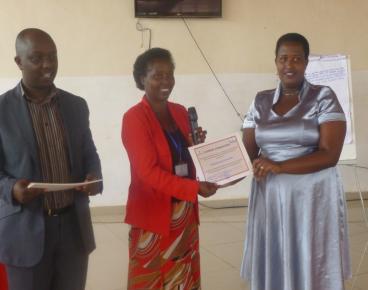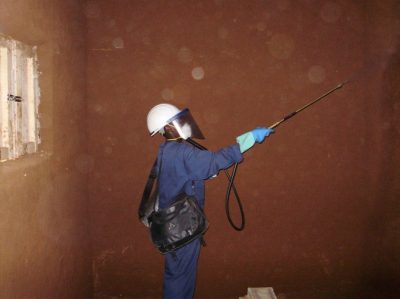By working hand-in-hand with local governments and community members in Rwanda, the PMI-funded Africa Indoor Residual Spraying (AIRS) project sprayed 98 percent of target structures with insecticide in 2012, thus killing mosquitoes that transmit malaria.

Bugesera vice-mayor Narumanzi Leonille awards a certificate of appreciation to a local leader, in recognition of her efforts to support IRS activities. Source: Abt Associates
Local authorities were instrumental in advocacy and support for IRS. For example, in Bugesera District in the Eastern Province, the vice-mayor, Narumanzi Leonille, participated in community mobilization activities which led to an increase in IRS acceptance levels. In Nyagatare, the district with the highest malaria burden in Rwanda, the vice-mayor, Musabyimana Charlotte, organized and participated in radio talk shows that urged communities to support IRS, resulting in 99 percent coverage of targeted structures.
Furthermore, district administrations also engaged national police. The vice-mayor of social affairs and the commander of police in Southern Province’s Gisagara District worked together to mobilize the police force to rally behind IRS activities. “It makes little sense to provide security to a sick community, a community suffering from malaria”, the commander commented, reiterating the need for all members of the community to take responsibility and participate in IRS activities. Leaders encouraged community members to support IRS by allowing their homes to be sprayed and preparing their homes prior to spraying (e.g removing food).
In the opening remarks during the national IRS review meeting in Kigali, Dr. Karema Corine, the head of the malaria division, said, “This is the first time district authorities have attended the national review meeting to present and share their own IRS results. This is commendable and only provides proof that ownership by the local authorities was the key to the great success of the project in 2012.”

